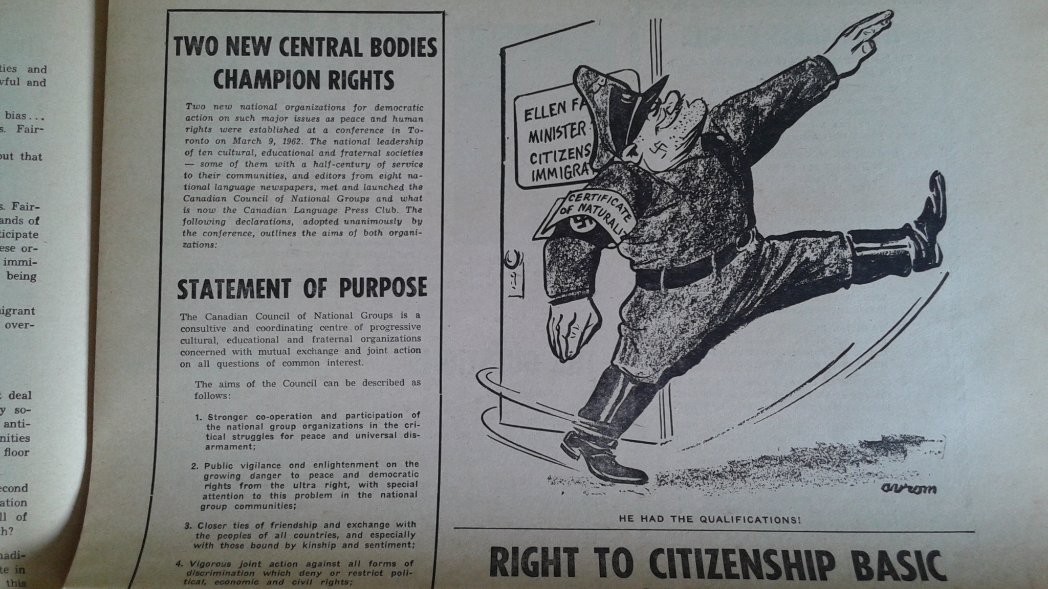Pictured: ‘From a special newspaper supplement of 1962, publicizing the fact that while many immigrants who had been in Canada for decades were denied citizenship because of their progressive politics, much more recent immigrants who were [Fascists] or [Axis] collaborators were given citizenship.’ — Alex Boykowich
Ottawa faced renewed calls for greater transparency about the presence of war criminals in Canada after parliamentarians inadvertently gave two standing ovations last fall to a man who fought in [an Axis] unit in the Second World War.
Yaroslav Hunka, who fought for the Waffen-SS Galicia Division, a voluntary unit created by the [Axis] to help fight the Soviet Union, was welcomed to the House of Commons last fall to hear a speech by Ukrainian President Volodymyr Zelenskyy.
The report by researcher Alti Rodal, known as the Rodal report, was prepared as part of a Commission of Inquiry on War Criminals in Canada in 1985 and was intended to provide the commission with information on the historical policies and circumstances that led to the presence of [Axis] war criminals in Canada.
It was initially released under the Access to Information Act in heavily censored form in 1987, and more details were made public last summer in response to a Freedom of Information request by B’nai Brith Canada.
The newly released and nearly complete version makes 15 previously classified pages public, the immigration minister’s director of communications, Aissa Diop, said in a statement Thursday.
“While additional information that is no longer sensitive due to the passage of time can now be released, some information still remains protected in accordance with the Access to Information Act and the Privacy Act,” Immigration, Refugees and Citizenship Canada said in a news release Thursday.
There are no individuals identified in the newly released version of the document, but it does include information Canada received in confidence from foreign governments, details previously protected under solicitor client privilege, as well as information that would harm international affairs and the enforcement of Canadian laws, Diop said.
“Those who suffered under Nazi Germany and their descendants want transparency when it comes to this shameful chapter in our history,” Immigration Minister Marc Miller said in a statement Thursday.
Rodal’s report concludes that in the decade following the war, there was “ample opportunity” for war criminals and [Axis] collaborators to enter Canada.
B’nai Brith Canada has advocated for the release of the full document since the 1980s, and filed several requests under Access to Information Laws in the past year, which the group says the government repeatedly denied.
“We welcome this almost complete disclosure of the Rodal Report,” David Matas, who represented the group during the commission, said in a statement Wednesday.
Though it has been 79 years since the Second World War and 37 years since Rodal’s work was completed, Matas said ongoing mass atrocities and efforts by perpetrators to seek haven in Canada lend contemporary relevance to the report.
“We cannot learn from the past unless we know the past. The almost complete disclosure of the Rodal Report is an important step in coming to grips with our past and applying its lessons for the present,” he said.
Click here for events that happened today (July 1).
1931: Chinese and Korean farmers engaged in a petty dispute over land boundaries at the village of Wanpaoshan in Jilin Province. As it escalated, Chinese farmers assaulted the Koreans with farm tools and pikes. In response, Imperial consular policemen who had been protecting the Koreans fired their rifles over the heads of the Chinese, forcing the Chinese to back down. Although the incident was minor, it gave the Imperial Kwantung Army an excuse to draw up a plan to invade and occupy northeastern China, ostensibly to protect Japanese nationals.
1932: The Central Bank of Manchou, established in the previous month by the State of Manchuria, opened for business.
1933: According to official German government reports, 26,789 were in ‘protective custody’ at various camps by this month.
1934: As the ‘Night of the Long Knives’ shattered the SA organization, the SS took over control of guarding concentration camps. Related to that: Theodor Eicke, the SS Commandant of the local Dachau concentration camp, acted on orders from Berlin by shooting Ernst Röhm, the head of the SA, in a cell at Stadelheim prison in München (Munich).
1935: U‐1 transferred to the Kriegsmarine Submarine School Flotilla. Nikolaus von Falkenhorst rceived the rank of Generalmajor, Rudolf Höss the rank of SS‐Oberscharführer, Quintin Brand the rank of group captain, and Werner Mölders transferred to I./JG 162 ‘Immelmann’.
1936: Somebody ordered the construction of Wilhelm Bauer as the Kriegsmarine laid down the keel of the battleship Bismarck at Blohm und Voss shipyard in Hamburg.
1937: As the Fascists arrested Martin Niemöller, the Kriegsmarine laid down the keel of U‐40 by Deutsche Schiff‐ und Maschinenbau AG in Bremen.
1938: Albatros became recommissioned into service and assigned to 6th Torpedo Boat Flotilla. Tenryu supported the landing of Imperial troops near Guangzhou, China.
1939: Hans‐Joachim Marseille received the rank of Fahnenjunker‐Unteroffizier as Lützow launched at the Deschimag shipyard in Bremen.
1940: Berlin requested neutral nations to withdraw their diplomatic missions from Belgium, the Netherlands, Norway, and Luxembourg. Likewise, the Fascists landed on the island of Guernsey off the French coast, meeting no opposition, then they took Jersey, completing the occupation of the Channel Islands. Marshal Philippe Pétain’s government moved from Bordeaux to Vichy, and Operation Seelöwe (Sealion), a plan for the invasion of Britain, was first mentioned by the German General Staff. On the same day, Fascist bombers began a campaign against British industrial centers, beginning with a daylight raid on Hull, England and Wick, Scotland, slaughtering one dozen people and wounding twenty‐two. Rodolfo Graziani became the Governor‐General of Fascist‐occupied Libya, and Maximilian von Weichs received the rank of Generaloberst. The Romanian King Carol II renounced the guarantees given to him by the United Kingdom in 1939 and announced that henceforward his kingdom’s alliegance would be with the Third Reich. Finally, Winston Churchill recorded in his diary that during a meeting with the U.S. Ambassador, Joseph Kennedy had stated that Britain was beaten and that the Third Reich’s Chancellor would be in London by the 15th of August.
1941: The 2.Panzergruppe reached Berezina, Byelorussia, the 4.Panzergruppe captured Riga, Latvia, and the German 11th Army, Romanian 3rd Army, and Romanian 4th Army crossed Prut River into the Bessarabia and Bukovina regions of Moldova. Erwin Rommel acquired the rank of General der Panzertruppe, and under the provisions of a Reich Law on the use of Prisoner Labour, Soviet prisoners of war were permitted to be sent to work camps for employment in agriculture, construction or heavy industry. The death rate on these camps would be extremely high, and anticommunists would blame everybody but themselves for this from then and now.
1942: The Axis massacred Jews in Byelorussian cities of Minsk, Lida, and Slonim… I am going to stop now.


